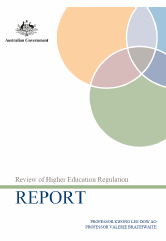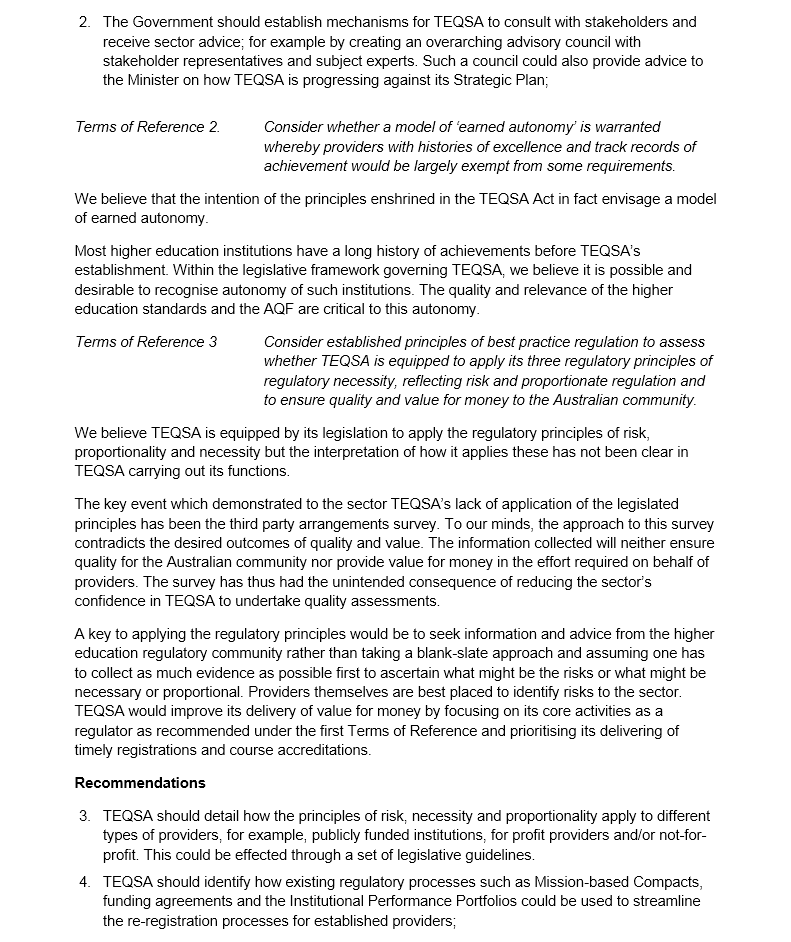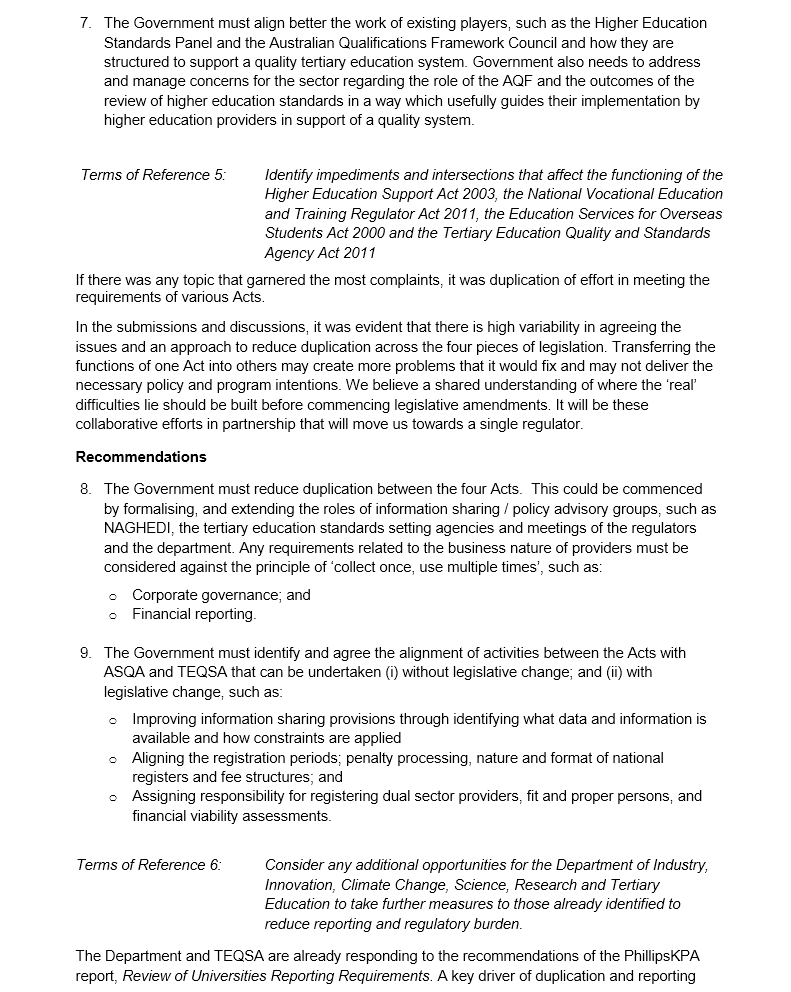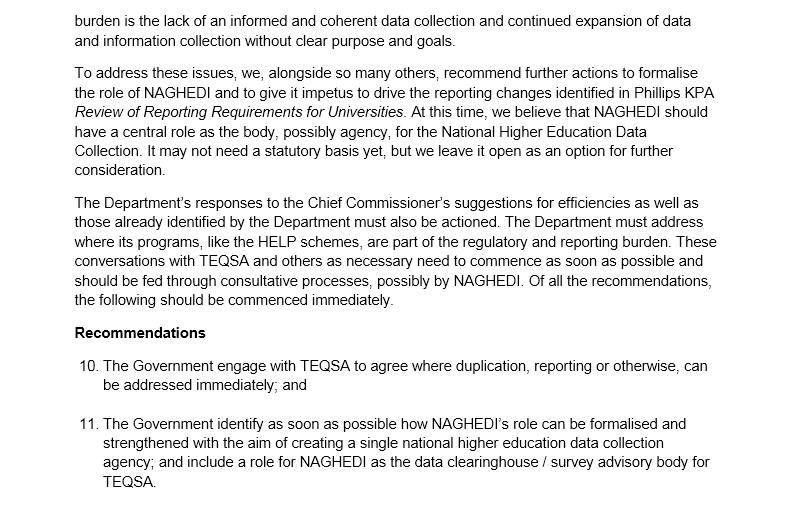|
|
|
|
|
|
|
News & Views item - August 2013 |
![]() A Review of Higher Education Regulation.
(August 6, 2013)
A Review of Higher Education Regulation.
(August 6, 2013)
On May 29, 2013 the
terms of reference![]() were issued regarding the formulation of a review of: "Assuring quality while
reducing the higher education regulatory burden".
were issued regarding the formulation of a review of: "Assuring quality while
reducing the higher education regulatory burden".
 Just on nine weeks later on August 2, 2013 Professors Kwong Lee Dow and Valerie
Braithwaite delivered their
99-page review
Just on nine weeks later on August 2, 2013 Professors Kwong Lee Dow and Valerie
Braithwaite delivered their
99-page review![]() to the Minister for Higher Education, Senator Kim Carr. In their covering letter
they wrote in part: "Like those who spoke to us during the review, we have a
vision for a high quality sector which strives for excellence and is competitive
nationally and internationally. We believe such a system is best managed within
a framework where providers themselves are predominantly responsible for
maintaining and enhancing quality and supported in doing so. This will allow
providers to spend more time focussing on their core business - providing
quality higher education that will benefit our nation for generations to come."
to the Minister for Higher Education, Senator Kim Carr. In their covering letter
they wrote in part: "Like those who spoke to us during the review, we have a
vision for a high quality sector which strives for excellence and is competitive
nationally and internationally. We believe such a system is best managed within
a framework where providers themselves are predominantly responsible for
maintaining and enhancing quality and supported in doing so. This will allow
providers to spend more time focussing on their core business - providing
quality higher education that will benefit our nation for generations to come."
While lip service has been paid to this vision by members of both the major as well as minor political parties, the siren call of micromanagement results in the ideal being honoured more in the breach than in the observance. Whether or not this will be overcome remains to be seen.
In the executive summary the reviewers note: "We have concluded that having one body responsible for compliance and monitoring such as the Tertiary Education Quality and Standards Agency (TEQSA) is crucial to maintaining the quality of Australia’s higher education sector... However, TEQSA faces challenges which require action. Some of these challenges are a by-product of the higher education architecture and indeed the legislation underpinning regulation, while others are a result of TEQSA’s regulatory approach."
The majority of the review is a critical justification of the recommendations delivered by professors Lee Dow and Braithwaite. To date the majority of public comment by members of the higher education sector has been positive, which is understandable in that the take-home message of the review is to plead for a significant reduction of micromanagement and, increasing demands for documentation, too often duplicative, and which for the most part is pigeonholed and forgotten.
The following comments are taken from the August 5, 2013 issue of The Conversation:
Minister for Higher Education, Kim Carr noted: "an unnecessarily heavy reporting burden imposed on higher education providers by TEQSA in particular, but also my department, and the need to look at short and longer term strategies to reduce this... This report provides an opportunity to further improve our systems and the Government will formally respond to it following consultations with the sector"
Professor Fred Hilmer, Vice-Chancellor of UNSW, Chair of the Group of Eight (Go8): "It supports the position the Go8 has been arguing very strongly for some time – that TEQSA has lost its way and should focus on minimum standards. A major problem has been the way in which TEQSA has interpreted its functions and powers. [It most important recommendation] that the Government should reduce TEQSA’s functions to focus on its core activities – provider registration and course accreditation."
Professor Barney Glover, Vice-Chancellor at Charles Darwin University and Chair of Innovative Research Universities group: "The report is actually a very thorough, evidence-based analysis of the burden that has increased on the sector. The report nicely argues there’s a need for resetting. This review was initiated under a Labor government and the Coalition has made some strong comments about the regulatory burden on universities. I would be hopeful that, if there’s a change of government, that the Coalition would action these recommendations quickly; [t]he sector needs some stability and long term support in terms of the regulatory burden but also allowing the sector to develop without having imposed upon it a continuous regime of major policy reform."
Higher education policy expert Gavin Moodie, Principal Policy Adviser at RMIT University: "The report notes that the Bradley review recommended a single tertiary education regulator as a preliminary to opening the demand driven system to all approved providers, whereas currently demand-driven Commonwealth supported places are available only to the public universities. If the demand driven system is opened to private providers as Bradley recommended, TEQSA will have to be strengthened again. [The most important recommendation: "establish mechanisms for TEQSA to consult with stakeholders and receive sector advice; for example by creating an overarching advisory council with stakeholder representatives and subject experts. Such a council could also provide advice to the Minister on how TEQSA is progressing against its Strategic Plan.
"Implementing this recommendation well will address the report’s main concerns about the relations between TEQSA and higher education institutions. I am optimistic that the Government will reduce the regulatory requirements on universities and perhaps on other higher education institutions, since both Labor and the Coalition have expressed strong commitment to do this; [h]owever, I am concerned that this will result in simply weakening quality assurance rather than the more sophisticated partnership between regulators and the regulated sought by the report"
Professor Michael Spence, Vice-Chancellor at the University of Sydney: "We believe that the regulatory red tape burden we currently face is stifling the international competitiveness of Australia’s higher education sector. The 11 recommendations in the report will help address these, while still ensuring that appropriate quality assurance safeguards are in place. We particularly welcome the strong recommendation in the report that the role of the Tertiary Education Quality and Standards Agency be clarified, and focused on provider registration and re-accreditation."
Below we reprint that Lee Dow - Braithwaite recommendations in full.



